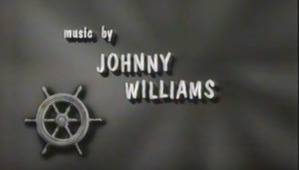
John Williams
John Williams told The Assocated Press earlier this month, that his score for Indiana Jones 5 may be his final movie work.
“I don’t want to be seen as categorically eliminating any activity,” The 90-year-old composer told AP. But a Star Wars score, he said, is a six-month commitment and “at this point in life is a long commitment to me.”
Williams is known mostly for his film scores, which include 51 Oscar nominations beginning in the 1960s for scores and songs. Williams was the composer of choice for director Steven Spielberg, a collaboration that lasted decades.
However, once upon a time, Williams was known as Johnny Williams and his work was all over television in the 1950s and 1960s.
Television Days
Williams played piano on the Peter Gunn theme for Henry Mancini. Williams also played as a musician in film scores such as The Magnificent Seven, Sweet Smell of Success and To Kill a Mockingbird, he recalled in a 2002 tribute to composer Elmer Bernstein.

Before he was famous: John(ny) Williams title card for the Kraft Suspense Theater episode Once Upon a Savage Night (black and white copy of a color original).
Williams was hired in 1958 by Stanley Wilson, music supervisor for Revue television (later Universal), to score episodes of M Squad, a police drama starring Lee Marvin. At that point, the composer was billed as John T. Williams Jr.
Wilson evidently liked the results and kept bringing Williams back for work. One of Williams’ jobs for Revue writing the theme for Checkmate, a 1960-62 series created by Eric Ambler.
Checkmate concerned the exploits of two private eyes (Anthony George and Doug McClure) assisted by an academic (Sebastian Cabot). Williams was now billed as Johnny Williams.

Before he was famous: John Williams title card for the unaired pilot of Gilligan’s Island.
Williams also did the theme (and scored some episodes for) a Revue anthology show, Kraft Suspense Theater. One of the installments he scored, Once Upon a Savage Night, was a particularly tense story about the search by Chicago authorities for a psychopathic killer (Philip Abbott).
In his TV days, Williams was versatile. His credits included the odd sitcom, such as the unaired pilot (plus additional episodes) of Gilligan’s Island as well as the theme for The Tammy Grimes Show, a quickly canceled program in the 1966-67 season.
Producer Irwin Allen brought in Williams to work on series such as Lost in Space and The Time Tunnel, which credited Johnny Williams for their themes.
Johnny Williams even showed up on camera in the first episode of Johnny Staccato, a 1959 series starring John Cassavettes and made at Revue. Williams, clean-shaven and with hair, played a jazz pianist. He was listed in the cast as Johnny Williams.
The Johnny Williams era drew to a close by the late 1960s. His credit for the theme of Irwin Allen’s Land of the Giants series listed the composer as John Williams. For Williams, the best was yet to come.
Filed under: Comic book movies, The Other Spies | Tagged: Checkmate, Close Encounter of the Third Kind, Irwin Allen, John Williams, Peter Gunn Theme, Revue, Stanley Wilson, Star Wars, Steven Spielberg, Superman, Universal | 5 Comments »





